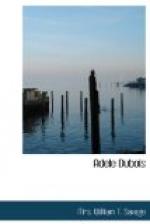Nor was the prophet singular in his experience of the woes of exile. We have heard of the lofty-spirited Dante, wandering from city to city, carrying with him, in banishment, irrepressible and unsatisfied yearnings for his beloved Florence; we have seen the Greek Islander, borne a captive from home, sighing, in vain, for the dash and roar of his familiar seas; we have seen the Switzer, transplanted to milder climes and more radiant sides, yet longing for the stern mountain forms, the breezes and echoes of his native land. Ah! who does not remember, with a shudder, the despairing thoughts, choking tears, and days of silent misery that clouded his own boyhood, and perhaps even some days of his early manhood?
Oublier je ne puis. Poor lady! she had been homesick twenty years.
On the afternoon following the conversation recorded in the last chapter, Mrs. Dubois was ready to unfold to Adele the story of her past life. They were sitting in the parlor. The golden glory of the September sun gave an intense hue to the crimson furniture, lighted up the face of the Madonna with a new radiance, and touched the ivory keys of the piano with a fresh polish. Adele’s eyes were fixed with eager expectation upon her mother.
“You know, ma chere”, Mrs. Dubois began, “we once lived in France. But you cannot know, I trust you never may, what it cost us to leave our beautiful Picardy,—what we have suffered in remaining here, exiled in this rude country. Yet then it seemed our best course. Indeed, we thought there was no other path for us so good as this. We were young, and did not enough consider, perhaps, what such a change in our life involved. I must tell you, my Adele, how it came about.
“In the province of Picardy not many miles from the city of Amiens, there was a fine, but not large estate, bordering on the River Somme. A long avenue of poplars led from the main road up a gentle slope until it opened upon a broad, green plateau of grass, studded with giant trees, the growth of centuries. Here and there were trim little flower-beds, laid out in a variety of fantastic shapes, with stiff, glossy, green, closely-clipped borders of box. And, what was my childish admiration and delight, there was a fountain that poured itself out in oozing, dripping drops from the flowing hair and finger tips of a marble Venus, just rising in the immense basin and wringing out her locks. Then the park,—there was none more beautiful, more stately, extending far back to the banks of the Somme, where birds sat on every bough and the nightingale seemed to pour its very heart away, singing so thrillingly and so long. I hear the liquid notes now, my Adele, so tender, so sweet! At the end of the avenue of poplars of which I spoke stood the chateau, with the trim flower-beds in front. It was built of brown stone, not much ornamented externally, with four round towers, one in each corner. Though not as old as some of those castles, it had been reared several centuries before, by a Count de Rossillon, who owned the estate and lived on it.




